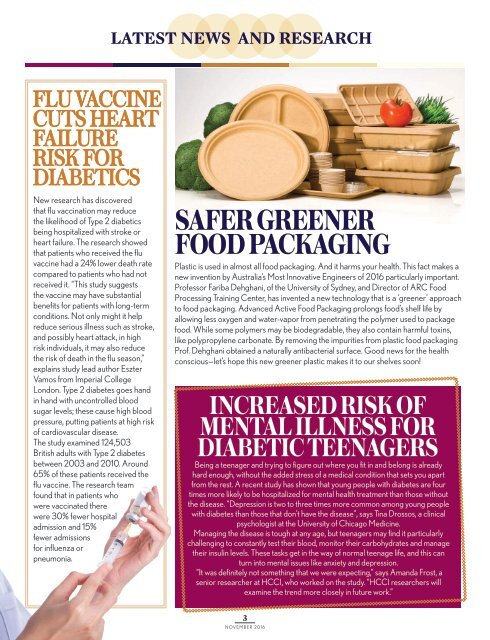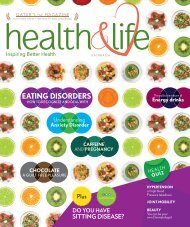14. November 2016 Health & Life Magazine
You also want an ePaper? Increase the reach of your titles
YUMPU automatically turns print PDFs into web optimized ePapers that Google loves.
LATEST NEWS AND RESEARCH<br />
FLU VACCINE<br />
CUTS HEART<br />
FAILURE<br />
RISK FOR<br />
DIABETICS<br />
New research has discovered<br />
that flu vaccination may reduce<br />
the likelihood of Type 2 diabetics<br />
being hospitalized with stroke or<br />
heart failure. The research showed<br />
that patients who received the flu<br />
vaccine had a 24% lower death rate<br />
compared to patients who had not<br />
received it. “This study suggests<br />
the vaccine may have substantial<br />
benefits for patients with long-term<br />
conditions. Not only might it help<br />
reduce serious illness such as stroke,<br />
and possibly heart attack, in high<br />
risk individuals, it may also reduce<br />
the risk of death in the flu season,”<br />
explains study lead author Eszter<br />
Vamos from Imperial College<br />
London. Type 2 diabetes goes hand<br />
in hand with uncontrolled blood<br />
sugar levels; these cause high blood<br />
pressure, putting patients at high risk<br />
of cardiovascular disease.<br />
The study examined 124,503<br />
British adults with Type 2 diabetes<br />
between 2003 and 2010. Around<br />
65% of these patients received the<br />
flu vaccine. The research team<br />
found that in patients who<br />
were vaccinated there<br />
were 30% fewer hospital<br />
admission and 15%<br />
fewer admissions<br />
for influenza or<br />
pneumonia.<br />
SAFER GREENER<br />
FOOD PACKAGING<br />
Plastic is used in almost all food packaging. And it harms your health. This fact makes a<br />
new invention by Australia’s Most Innovative Engineers of <strong>2016</strong> particularly important.<br />
Professor Fariba Dehghani, of the University of Sydney, and Director of ARC Food<br />
Processing Training Center, has invented a new technology that is a ‘greener’ approach<br />
to food packaging. Advanced Active Food Packaging prolongs food’s shelf life by<br />
allowing less oxygen and water-vapor from penetrating the polymer used to package<br />
food. While some polymers may be biodegradable, they also contain harmful toxins,<br />
like polypropylene carbonate. By removing the impurities from plastic food packaging<br />
Prof. Dehghani obtained a naturally antibacterial surface. Good news for the health<br />
conscious—let’s hope this new greener plastic makes it to our shelves soon!<br />
INCREASED RISK OF<br />
MENTAL ILLNESS FOR<br />
DIABETIC TEENAGERS<br />
Being a teenager and trying to figure out where you fit in and belong is already<br />
hard enough, without the added stress of a medical condition that sets you apart<br />
from the rest. A recent study has shown that young people with diabetes are four<br />
times more likely to be hospitalized for mental health treatment than those without<br />
the disease. “Depression is two to three times more common among young people<br />
with diabetes than those that don’t have the disease”, says Tina Drossos, a clinical<br />
psychologist at the University of Chicago Medicine.<br />
Managing the disease is tough at any age, but teenagers may find it particularly<br />
challenging to constantly test their blood, monitor their carbohydrates and manage<br />
their insulin levels. These tasks get in the way of normal teenage life, and this can<br />
turn into mental issues like anxiety and depression.<br />
“It was definitely not something that we were expecting,” says Amanda Frost, a<br />
senior researcher at HCCI, who worked on the study. “HCCI researchers will<br />
examine the trend more closely in future work.”<br />
3<br />
NOVEMBER <strong>2016</strong>
















